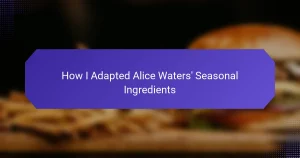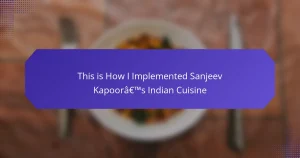Key takeaways
- Mastering fundamental techniques, like knife skills and sautéing, enhances cooking efficiency and dish presentation.
- Jacques Pépin’s emphasis on creativity and storytelling in cooking fosters a more engaging culinary experience.
- Patience and attention to detail are crucial for executing techniques correctly, transforming setbacks into valuable learning moments.
- Applying modern techniques can elevate home cooking, making dishes aesthetically pleasing and flavorful.
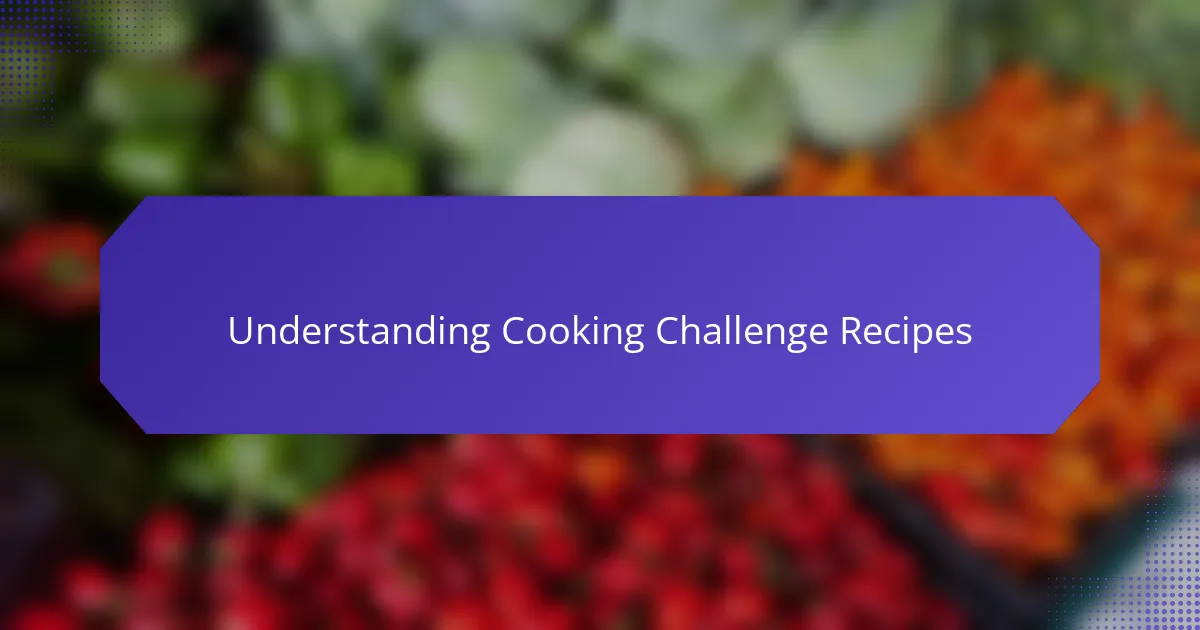
Understanding Cooking Challenge Recipes
When diving into cooking challenge recipes, I find that understanding the techniques of renowned chefs like Jacques Pépin can transform the way I approach these culinary tasks. His emphasis on classic methods, such as knife skills and precision, inspires me to simplify complex challenges into manageable steps. I remember the first time I tackled a daunting recipe; adopting Pépin’s philosophy helped me savor the process rather than just focusing on the finished dish.
In my experience, these cooking challenges push us to explore new flavors and improve our skills, often transforming the kitchen into an exciting space of discovery. By observing and practicing techniques from chefs like Pépin, I’ve gained a greater confidence in my abilities. Here’s a quick overview of essential techniques that can enhance any cooking challenge:
- Knife Skills: Mastering the basic cuts—dice, julienne, chiffonade—can make your prep work quicker and more efficient.
- Flavor Building: Understand the importance of layering flavors through techniques like sautéing and deglazing, which can elevate your dishes.
- Plating: Focus on presentation; Pépin’s artistry in plating inspires me to make each dish visually appealing.
- Ingredient Selection: Choose fresh, high-quality ingredients; they make all the difference in the final outcome.
- Timing: Learn to manage time effectively so that all elements of a dish come together perfectly, creating a seamless meal experience.
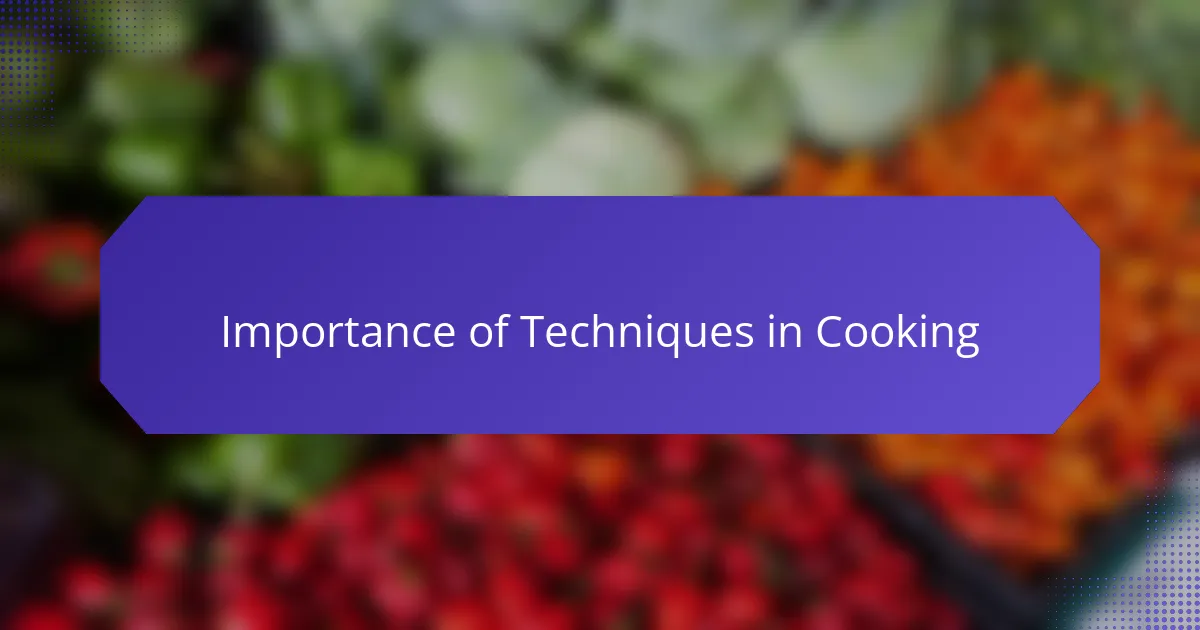
Importance of Techniques in Cooking
When I think about cooking, techniques are the backbone of every dish. They provide a framework that allows creativity to flourish. For instance, mastering a simple knife technique can elevate a dish from average to extraordinary, as I learned firsthand when I started refining my chopping skills; it transformed my vegetable dishes into a colorful and appealing feast.
I’ve often found that good techniques can save time and reduce mistakes, making the cooking process feel more enjoyable. The simplification of complex methods into digestible steps, as seen in Jacques Pépin’s approach, empowered me to cook more confidently. Each time I execute a technique correctly, it’s like a little victory in my culinary journey.
Here’s a comparison of some key techniques that are essential in cooking:
| Technique | Importance |
|---|---|
| Knife Skills | Enhances precision and presentation. |
| Sautéing | Promotes flavor development and speed. |
| Emulsifying | Creates smooth and cohesive mixtures. |
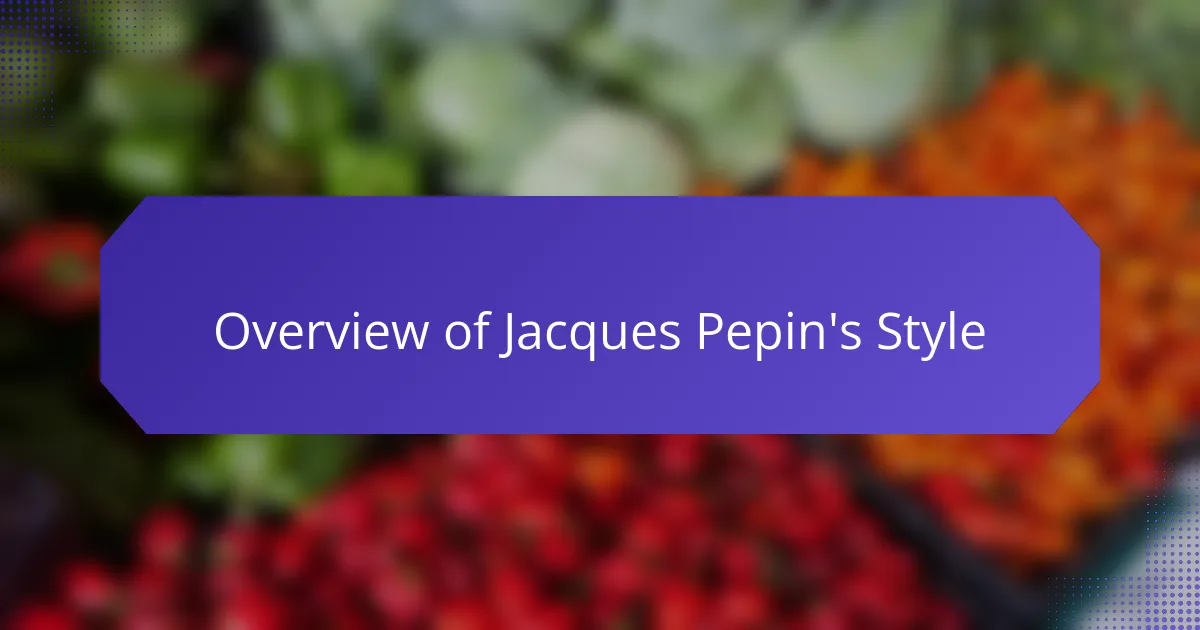
Overview of Jacques Pepin’s Style
Jacques Pépin’s cooking style strikes a delightful balance between classical French technique and accessibility. I fondly remember the first time I watched him effortlessly transform simple ingredients into extraordinary dishes. His approach emphasizes the importance of mastering the basics while encouraging creativity—a philosophy that resonates with both novice cooks and culinary enthusiasts alike.
One of the most compelling aspects of Pépin’s style is his passion for storytelling through food. He doesn’t just teach recipes; he shares memories, inviting us into his kitchen as if we were family. This personal connection makes his techniques feel more like a conversation than mere instruction. Here are some key elements of Jacques Pépin’s style:
- Mastery of classic French techniques, which form a solid foundation.
- Emphasis on simplicity and efficiency in cooking methods.
- A focus on fresh, high-quality ingredients to enhance flavors.
- Encouragement of creativity in presentations and flavor combinations.
- Personal anecdotes that connect culinary skills to life experiences.
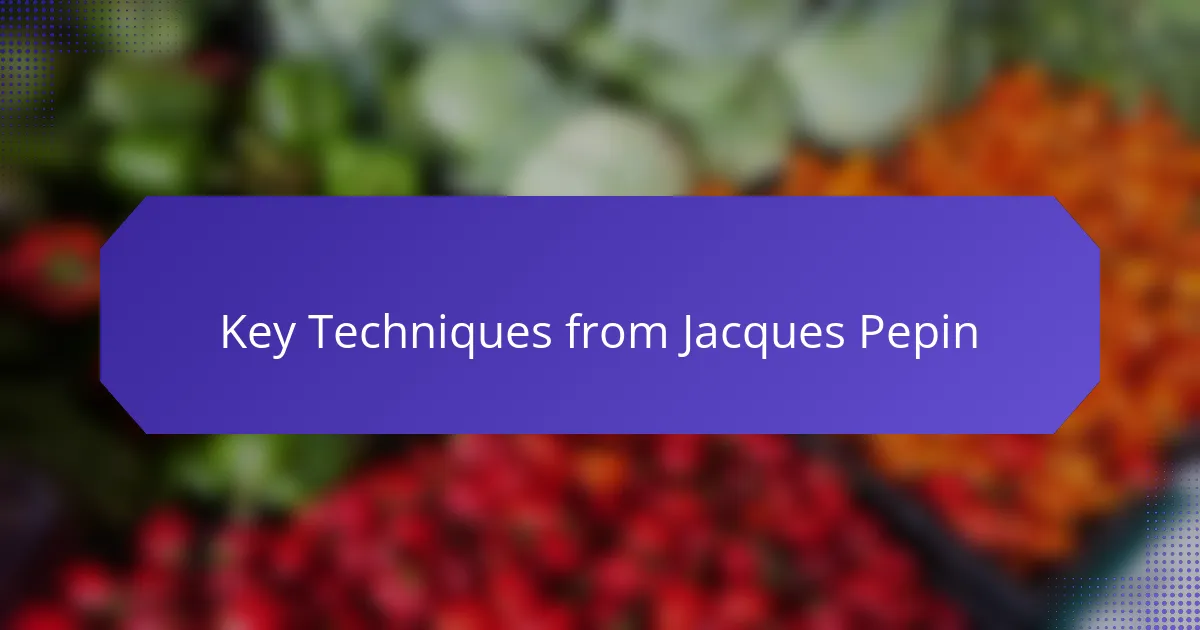
Key Techniques from Jacques Pepin
When exploring Jacques Pepin’s techniques, one of the most striking aspects is his approach to knife skills. I’ve found that mastering the art of chopping vegetables not only improves efficiency in the kitchen but also adds an element of satisfaction to my cooking. Pepin emphasizes precision and control, which makes the process enjoyable rather than a chore.
Another fundamental technique he champions is the use of classic French cooking methods, like sautéing. I recall the first time I used his advice on high-heat cooking; the result was a beautifully seared piece of chicken that made my guests rave about my newfound skills. It’s amazing how mastering simple techniques can elevate everyday meals.
Finally, the way Pepin utilizes every part of an ingredient resonates with me. His philosophy on waste reduction promotes a sustainable cooking practice that feels morally rewarding. I often find myself inspired to create something delicious from what would otherwise be leftovers, thanks to his influence.
| Technique | Description |
|---|---|
| Knife Skills | Emphasizes precision and control for efficient chopping and preparation. |
| Sautéing | High-heat cooking for quick and flavorful results. |
| Ingredient Utilization | Encouraging the use of every part of an ingredient to reduce waste. |
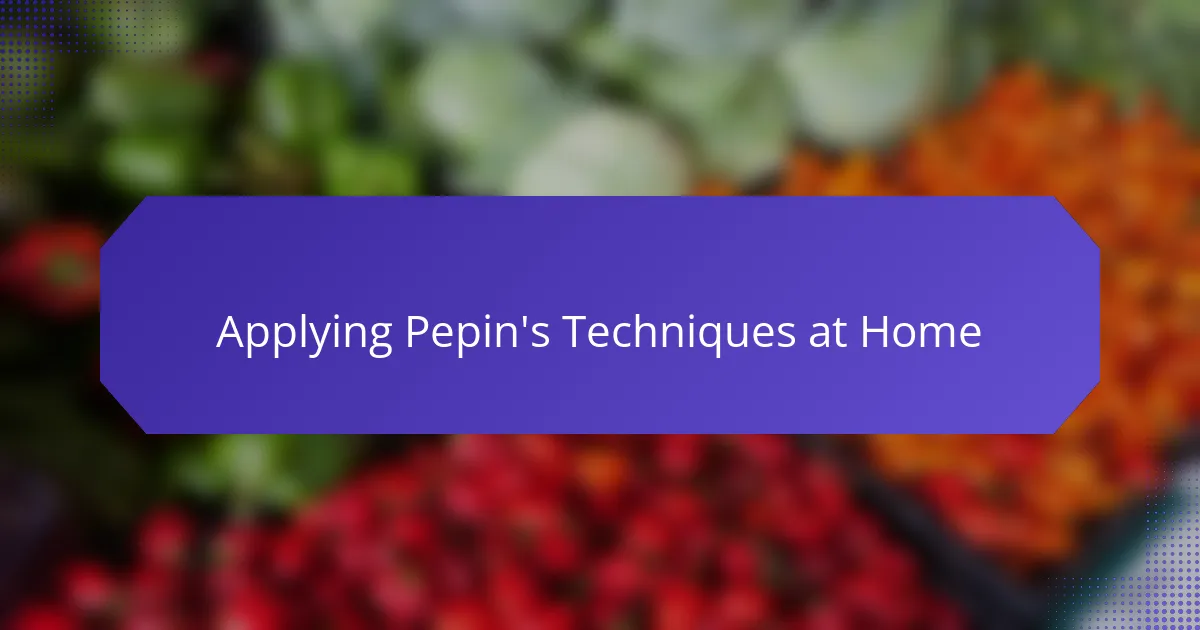
Applying Pepin’s Techniques at Home
Applying Pepin’s techniques at home can truly elevate your cooking. I remember the first time I tried his method for deboning a chicken. It seemed daunting, but following his step-by-step approach made it feel almost effortless. Pepin emphasizes the importance of precision and respect for the ingredients, which I found profoundly inspiring.
When I started using his techniques, my dishes not only looked better but tasted more refined. For example, the classic French knife skills he demonstrates are invaluable. I vividly recall how slicing vegetables with care transformed my stir-fries from mundane to magnificent.
Now, let’s explore a comparison of Pepin’s techniques versus traditional cooking methods in the table below:
| Pepin’s Techniques | Traditional Cooking Methods |
|---|---|
| Focus on precision knife skills | Basic chopping, not emphasizing technique |
| Emphasis on ingredient respect and preparation | Less attention to ingredient handling |
| Time-efficient methods for complex dishes | Longer, more labor-intensive processes |

Personal Experience with Cooking Challenges
Developing my skills through cooking challenges has been both exhilarating and humbling. I still remember the rush I felt when I first attempted a complex dish inspired by Jacques Pépin. The challenge of mastering perfect knife cuts transformed my approach. It was no longer just about finishing a recipe; it became a journey that taught me to appreciate every slice and chop.
During these cooking challenges, I’ve realized how crucial patience is. The first time I tried making a traditional French sauce, I was so eager to taste it that I rushed through the process. I ended up with a lumpy mixture instead of a smooth emulsion. It’s moments like these that remind me how attention to detail makes all the difference in the kitchen. Have you ever faced a similar frustration? Often, it’s those small setbacks that lead to the biggest learning moments.
Reflecting on my experiences, I find that cooking challenges often push me outside of my comfort zone. I remember tackling a recipe that involved flambéing—something I had never done. The initial fear of flames turned into a thrilling moment of triumph. Successfully executing that technique felt like a rite of passage, reinforcing my belief that stepping outside my comfort zone ultimately enhances my culinary journey.

